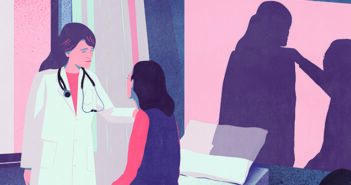How do you stop being a doctor?
An acquaintance was telling me about his father-in-law who is 83 and recently fell. He suffered a brain injury that required surgery and a month in the ICU. “He’s a physician,” the man explained, “so he’s eager to fully recover and get back to seeing his patients.”
Wait, what?
This issue’s cover story on alumni entering retirement has me thinking a lot about what I want from my “golden years.” The imaginary scene involves Cape Cod, a small, friendly dog, and plenty of time for writing. It does not involve working when I’m 83.
But I suspect for this physician, he’s not merely working. Being a doctor isn’t like doing a job; it’s much more a part of a person’s identity. You don’t stop being a doctor when you log out of the EHR at night. So how do you retire and suddenly stop being the person you’ve been for 40 or 50 years? You don’t, and I think that’s why many physicians are reluctant to stop practicing.
The close, unique relationships doctors form with patients are another reason I think it’s hard to step away. When I interviewed Roxanne Vrees for this issue’s alumni profile (see page 34), she said what she loves about ob/gyn practice is the potential to be with a patient through so many of life’s milestones, from adolescence through the birth of a child through menopause. When you have been that intimately intertwined with another person’s life, how do you up and leave them behind?
Doing some early research for the retirement feature on page 16, I spoke to Mark Nunlist ’70 MD’80, who was building a boat with his newfound free time. I asked him if there was anything he missed.
“I miss 30-plus years in the same practice taking care of folks that I had delivered,” he told
me. “I miss my staff. I miss the relationships of three decades with patients and colleagues.”
Now that is something I can relate to.
—Kris Cambra, Editor
I was astonished to read Drs. Lewiss and Sharkey’s article, “Silent No More” (Fall 2019), in which a male surgeon forcefully tries to kiss a female Brown premedical student on day two of her internship. The piece ends with the question,“What happened to the Brown premedical student?” The more important question that is omitted is, “What happened to the male surgeon?” There is no mention of anyone circling back with him to help him understand that his actions were inappropriate. What may have happened on day three and beyond to other students who feared reporting him, thinking it could tarnish their career trajectories? I recall witnessing a senior male physician admonishing a junior female physician, “Don’t be a victim.” The real issue is, “Don’t be a perpetrator.”
—Lynn E. Taylor RES’00 F’05, MD
via email



